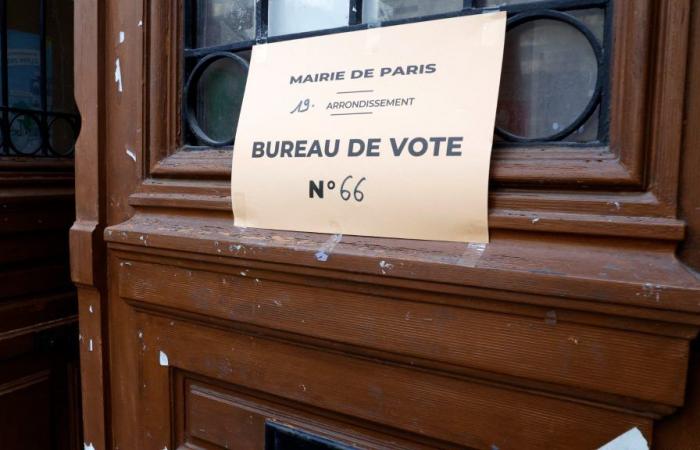The end of the first round of these early legislative elections has seen the famous voting instructions for the second round multiply on television sets. “Neither RN nor LFI”, “Republican barrier”… Are voters following the demands of the party headquarters?
The first round of the legislative elections this Sunday, June 30, has barely finished before the second is on everyone’s lips. With an expression that is rising among the presidential majority and the left-wing parties, in an increasingly pressing manner: the instruction to vote against the National Rally. Because the RN and its allies could obtain an absolute majority in the National Assembly, with 255 to 295 seats, according to our Elabe projection for BFMTV, RMC and La Tribune on Sunday – the threshold being set at 289 deputies.
>> 2024 legislative elections: the complete results
What to do in this context? “The extreme right is at the gates of power,” warned Prime Minister Gabriel Attal, calling to “prevent the National Rally from having an absolute majority.” “Faced with the National Rally, the time has come for a large, clearly Democratic and Republican gathering for the second round,” said Emmanuel Macron in a written statement sent to the media at 8 p.m.
With or without LFI? According to our information, the President of the Republic has asked his teams to study each constituency to find alliances, including with certain rebellious candidates – even if leading figures in his camp seemed until now to be leaning towards “neither RN nor La France insoumise”.
On the left, there is consensus on the call for a blockade against the RN. “Never the National Rally”, chants the union of the left called the New Popular Front. The latter amounts to “the collapse of France”, threatens the union of the right-wing RN, the faithful of Marion Maréchal and the pro-Éric Ciotti. On the side of the loyalist Republicans, clarity is not there: LR refused to give indications for the second round.
Outdated instructions?
These voting instructions are not only for activists. A few days before the first round, the president of the ecologists, Marine Tondelier, wrote to the party leaders of the Macronist camp (Horizons, Renaissance, Modem, UDI) to convince them to accept a “republican withdrawal” in order to beat the RN in the second round, in the event of a three-way race.
Often the work of political parties, but also increasingly that of influential people from civil society, the voting instruction is launched on the sets, hammered home on social networks. But by pointing too far North, does this compass still indicate the right direction for voters today?
Interviewed by BFMTV.com, several voters admit to hearing these voting instructions, but not being sensitive to them. The current period has a lot to do with it, leaving little room for doubt, as the political debate is so polarized.
It is now opinion that dominates and “less and less attachment to a party”, analyzes political scientist Benjamin Morel with RMC.
Vote of conviction
Affiliation to a political movement, whether militant or of the heart, is less and less developed. “Before, when you were a communist voter, you followed the party’s instructions, and these instructions were prescriptive of the vote. Today, the affiliation and the feeling of belonging to a political camp or a party is much weaker, and the figures are largely discredited”, explains the doctor in political science at the University of Paris Panthéon Assas.
In thirty or forty years, political families have seen their membership numbers decline. “Voters are less ideological, less partisan today. With the major right/left markers increasingly fading, voters are now making them for themselves,” observes Bruno Cautrès, an analyst of political attitudes and behavior at Cevipof.
“I often vote for what is requested but not because of the request of the political party, it’s just that our interests and our values align,” Marie, a young bookseller, told BFMTV.com before adding: “I vote according to my convictions which are often aligned with those of the party I chose in the first round.”
Valérie, in her fifties and unemployed, doesn’t care who says what and refuses to make calculations: “I choose a candidate, not a party. And I always choose the candidate who has the same convictions as me, the rest doesn’t matter to me. “I’m not interested,” she claims. The same goes for her daughter, Dina, a middle school teacher: “I rely solely on my convictions,” she says.
“The Republican Dam”: a turning point after 2022
To win the presidential election in 2017 and 2022, candidate Emmanuel Macron was able to count on a strong Republican front and the commitment of left-wing voters against the National Rally candidate, Marine Le Pen. But this tends to weaken, despite the demands this Sunday from the presidential camp after the second round of the legislative elections.
“Your vote obliges me,” the president declared on the evening of his re-election in 2022. “Except that after the pension reform, the immigration law and the unemployment insurance reform… Go ask a voter left to continue to block the RN by choosing a Macronist candidate for the legislative elections who defended these laws… It’s going to be complicated!” exclaims Bruno Cautres.
The one who is also a researcher at the CNRS notes that since the last legislative elections, the left-wing voter will tend to abstain or vote blank rather than refer to the instructions of a Macronist or centre-right party that he has often helped and which has often disappointed him.
The last Elabe survey for BFMTV La Tribune Dimanche published the day before the reserve period, Friday June 28 confirms that a majority of voters now refuse to “block”: only 25% of Macronist voters call for their candidate to withdraw, if he comes in third place, to beat a left-wing opponent, 31% for a Le Penist opponent. As for those of the RN, only 18% call for withdrawal to block an NFP candidate.
Already in 2022, the Republican barrier had worked much less than in 2017. Unlike the second round of 2002 where left-wing voters massively united with the centrists of the UDF and the Gaullist right of the RPR to re-elect Jacques Chirac against Jean-Marie Le Pen.
The results of the National Rally in the last legislative elections and in the European elections in June have made it a stable system. Having become a structuring part of the political system and de-demonized by the work of Le Pen’s daughter, “the order to block the extreme right among centrists and the traditional right is no longer as powerful,” observes Bruno Cautrès, a professor at Sciences Po and an analyst at Cevipof.
Today, only left-wing voters are still numerous (40%) to call for a “barrier” when it comes to defeating the National Rally, according to the Elabe opinion survey of June 28.
Membership varies depending on the candidates and parties.
As this is a local election, depending on the candidates, however, the instruction can hit the mark. “If the voter has a centrist in his constituency who has shown independence from the majority over the last two years, then yes, why not, it can work,” qualifies the Cevipof political scientist.
Political colors also play a role: if in a constituency, the presidential coalition has invested a former local mayor, a former socialist for example, “it will be easier for left-wing voters to adhere to the instruction of Ensemble rather than he is a pure Macronist”, continues Bruno Cauvrai.
Several factors explain this decrease in the impact of the voting instructions issued by political parties. Previously blocks of mass influence for both voters and activists – “before you could spend your entire career in a party”, recalls Bruno Cautrès – political families are now suffering from their increasingly blurred boundaries which reduce their influence.
“Whether an LR goes to Macron or a PS to Macron, it blurs the lines. And when the lines are very blurred and the moral dilemma is too great, the voter abstains or votes blank,” adds the researcher.
Certain parties like the RN, with a still very identified political line, always manage to create support for the votes of their voters. “If we tell you that you are pro-RN, you will vote for the RN candidate without asking yourself a thousand questions,” notes Bruno Cautres.
The instruction, now on social networks?
Far from the television sets and party circles, the noise and impact of the voting instructions are increasing on social networks. According to the Cevipof analyst, it is more on their phones, watching videos of their favorite influencers or reading posts from this or that activists that voters are getting more and more information.
In addition to videos and images on social networks, voters have access to a multitude of information channels. “Every voter can now play the role of a fact-checkeur in his corner, considerably weakening the weight of political speech which becomes only one source among others of messages”, recognizes Bruno Cautres.
Before concluding: “Today it is the influencers and the editorialists who create the political debate and the indignation”. Plus the parties and their voting instructions.






